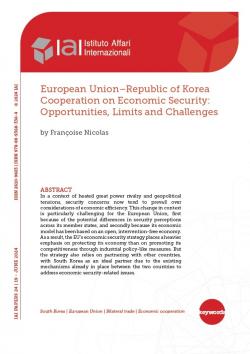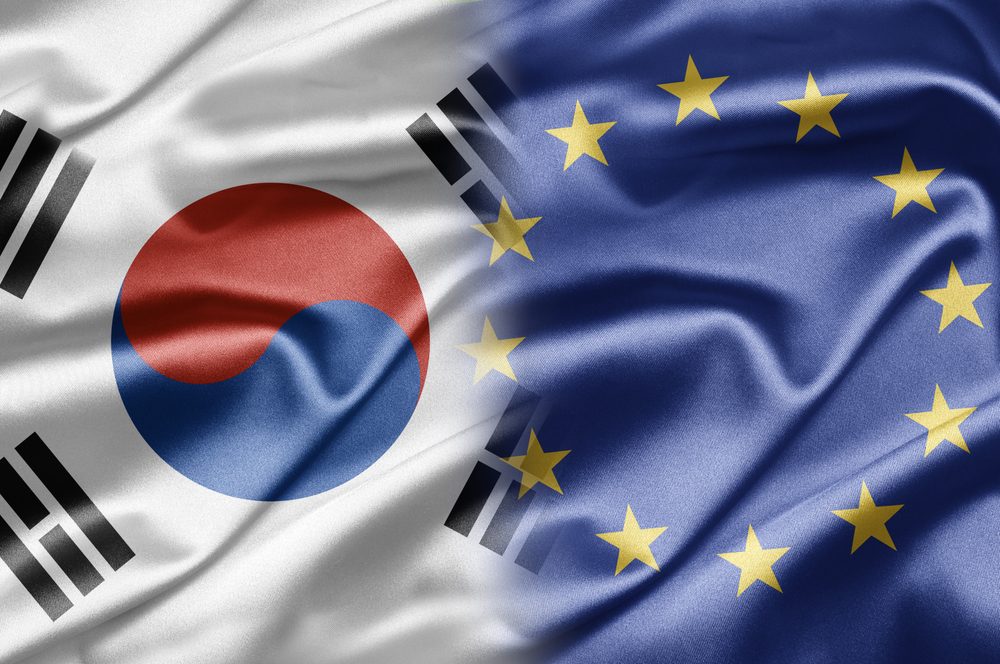European Union–Republic of Korea Cooperation on Economic Security: Opportunities, Limits and Challenges

This piece is a revised version of a paper presented at the conference on “New Convergences in EU-ROK Economic Security Relations”, organised in Rome on 30 January 2024 by the Istituto Affari Internazionali (IAI).

In a context of heated great power rivalry and geopolitical tensions, security concerns now tend to prevail over considerations of economic efficiency. This change in context is particularly challenging for the European Union, first because of the potential differences in security perceptions across its member states, and secondly because its economic model has been based on an open, intervention-free economy. As a result, the EU’s economic security strategy places a heavier emphasis on protecting its economy than on promoting its competitiveness through industrial policy-like measures. But the strategy also relies on partnering with other countries, with South Korea as an ideal partner due to the existing mechanisms already in place between the two countries to address economic security-related issues.
Table of content
Introduction
1. The rise of economic security concerns
1.1 The discontent with globalisation
1.2 Defining economic security
2. The EU and economic security
2.1 The need for a paradigm shift in the EU
2.2 The EU’s economic security strategy: Derisking as a priority
2.3 The instruments of EU’s economic security strategy
3. Scope for cooperation on economic security
3.1 General considerations on the challenges of bilateral cooperation
3.2 The way forward
References
>>> Read the article on the Instituto Affari Internazionali's website.

Available in:
Regions and themes
ISBN / ISSN
Share
Related centers and programs
Discover our other research centers and programsFind out more
Discover all our analyses
Opening up the G7 to South Korea to Address Contemporary Global Challenges
The G7’s global influence has diminished as powers like China reshape international governance through initiatives such as BRICS and the Shanghai Cooperation Organisation (SCO). With the G7 now representing just 10 per cent of the world’s population and 28 per cent of global GDP, its relevance is increasingly questioned.
Expanding SPDMM as a pivotal institution in the Pacific – A French perspective
The South Pacific Defence Ministers’ Meeting (SPDMM) is the only forum that brings together defense ministers from the wider South Pacific — including Chile, which is hosting it for the first time. This heterogeneous group of countries with varying resources, capacities, and interests — Australia, Chile, Fiji, France, New Zealand, Papua New Guinea (PNG), and Tonga — are united by their shared determination to strengthen cooperation on maritime security and humanitarian assistance and disaster relief (HADR) activities.
EU’s Derisking From China: A Daunting Task
With economic security as a major concern, the EU has recently turned to “derisking” from China. The EU strategy entails reducing critical dependencies and vulnerabilities, including in EU supply chains, and diversifying where necessary, while recognizing the importance and need to maintain open channels of communication.
Sri Lanka’s NPP Government. From System Change to Structural Compliance
In September 2024, a relative outsider to Sri Lanka’s two-party-dominated political system, Anura Kumara Dissanayake, won the presidential elections. The anti-establishment, populist movement he represented, the National People’s Power (NPP), went on to receive an overwhelming mandate in the November 2024 general elections, winning 159 seats in a 225-member parliament.










